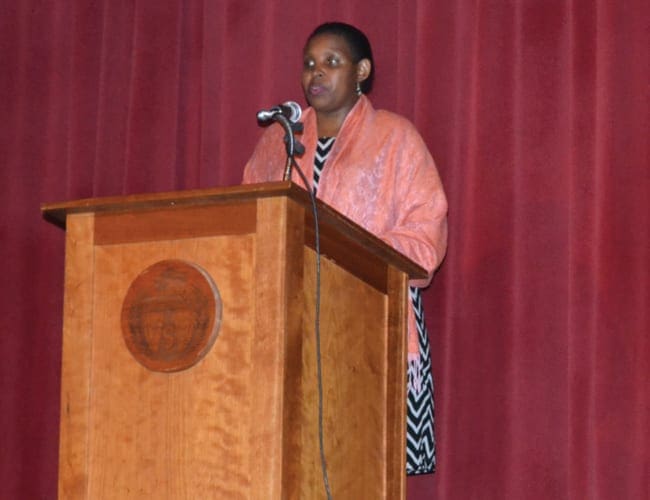Shaker High School held its first Holocaust Remembrance Ceremony Tuesday, April 29, and had a survivor of the Rwandan genocide speak about how important it is to remember these events so they don’t happen again. The main speaker, Eugenie Mukeshimana, survived the Rwandan genocide that took place 20 years ago in 1994. Mukeshimana, a Saint Rose graduate, founded the Genocide Survivors Support Network. She created the organization after working with homeless people in New York and New Jersey and discovering how many survivors immigrated to the United States from Rwanda. When Mukeshimana began speaking at Shaker Tuesday night, she was surprised that a high school was holding a ceremony like it was. “I can tell you that there are not many schools that have this kind of program. You should be very proud of having this type of program at your school,” Mukeshimana told the audience with a strong Rwandan accent. “I wish I was here for something different something more uplifting because of the springtime, but because of the history that has shaped my life and the life of others that came before us, here we are tonight,” said Mukeshimana. The Rwandan genocide lasted roughly three months and was the result of a civil war. The former government began killing people that were Tutsi and moderate Hutu, until they were stopped by the Rwandan Patriot Front (RPF) . When the genocide began, Mukeshimana was a young adult and was also eight months pregnant. Giving birth to her child alone in a field, she knew first-hand what a mother would go through to keep her child alive. She also saw what lengths people would go to in order to help others when a neighbor hid her and four more women. Mukeshimana was able to escape, but the four other women hiding in the same home were found and executed. She learned later on in her life that her family was Tutsi. As a child, no one talked about what they were, if they were Tutsi or Hutu. That changed when an order was handed down by the government to kill people belonging to certain ethnic groups. “That was an order from the government, just like they did to all the Jews in Europe. I guess they took notes … in 1994 came my family’s time. I tried to stay alive as best as I could. It was difficult because it’s hard to believe that the people you grew up with — neighbors that you know, they know you — one day they will wake up, grab a machete, come to your doorstep and try to kill you,” said Mukeshimana. Mukeshimana lost her father, husband, sister, aunt and uncle in the genocide, along with countless neighbors and friends. After coming to America and attending Saint Rose in 2001, she discovered how little people knew about the genocide. At first she didn’t say anything because she didn’t want people to think she was a murderer, but then she wanted to make sure people didn’t forget so she began talking about her experience. “I was angry that they didn’t know — my classmates my teachers — I actually thought that people knew. So before I came over from Rwanda, I decided not to tell anyone because I was afraid they would think I was a killer. Then, I realized they had no idea. That made me angry that you could lose a million people and nobody knows,” said Mukeshimana. As painful as it was for her to relive the experiences, she felt talking about it to people outweighed the pain. She said people were already trying to deny the genocide happened and that if no one talks about it, it doesn’t give any justice to the people who aren’t here. The week of April 27 through May 4 was Holocaust Remembrance Week. The Rwandan genocide ended April 7, so that is remembered April 7-14. Shaker English teacher Thea Macfawn is a teaching fellow with the United States Holocaust Memorial Museum and was awarded a fellowship last spring. “Part of my responsibility as a fellow is to go into my community and find a way to commemorate the Holocaust, to recognize the Holocaust and to also provide other people some education about it,” said Macfawn. Students in the Human Rights class began working on projects at the beginning of the school year. Sophomores Daniel Arango and Mikaela Natale chose the Holocaust for their project and read the stories of survivors in the ceremony. They got involved to help other students learn more about the Holocaust. “The main message here is to inform people about things they went through. We don’t know, we could never experience what they went through,” said Arango. “I think it’s really important because people don’t remember because it was so long ago that we can just forget about it. Even some of the wars we forget about like the Vietnam War or the Korean War,” said Natale. Mukeshimana said there are many parallels between the Rwandan genocide and the Holocaust.
“All the stages, the dehumanization of people, the first wave of violence where you are trying to taste the international community reaction, like fishing out what it was all about. There wasn’t any reaction, so they thought we can go further. We had small-scale killings before the big one. The propaganda is one thing that really kind of prepares people to write off other people,” said Mukeshimana. Even though she suffered unimaginable difficulties, Mukeshimana doesn’t like to compare the suffering that both groups of people endeared. “Our genocide was only three months and it felt like 30 years. I don’t know what it is like for someone to experience that for five years. I can’t even try to. I don’t know how you do it for five years,” said Mukeshimana.
Rwandan genocide survivor speaks at Shaker High School
Leave Comment



